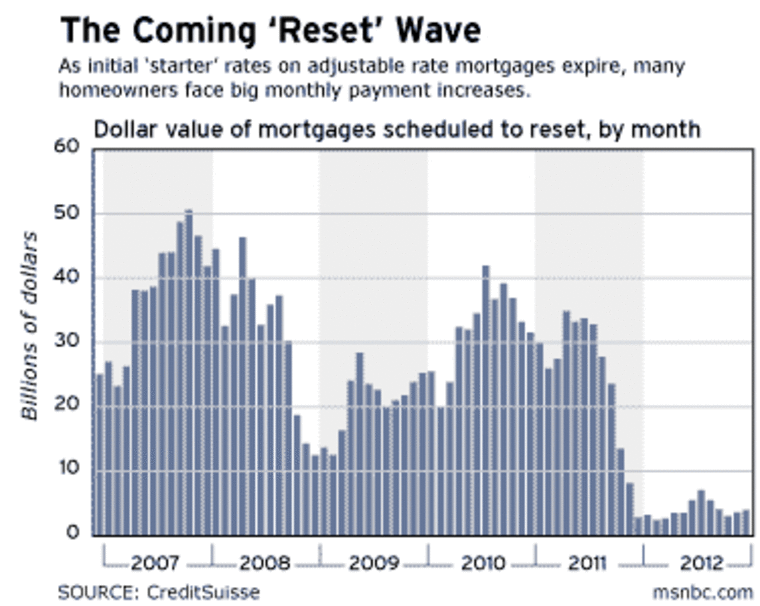A pick-up in sales of existing home earlier this week had some homeowners wondering if the steep housing slump may be coming to an end. But the latest data on new homes sales reported Wednesday indiciate that such optimism is premature and that this spring will likely be another washout for the residential real estate market.
“There is no clear bottom yet,” said David Blitzer, chief economist for Standard and Poor’s, which tracks home prices. “We hope it comes soon. But right now it's a hope.”
Homebuilders got fresh reminder of that on Wednesday, when the latest monthly numbers showed that sales of new homes fell in February for the fourth straight month, a 13-year low.
The Commerce Department reported that new home sales dropped 1.8 percent last month to a seasonally adjusted annual rate of 590,000 units, the slowest sales pace since February 1995, a little worse than expected. The median home prices dropped to $244,100, down 2.7 percent from the level of a year ago.
Another widely watched measure of home prices fell 10.7 percent in January compared to a year ago, according to the latest reading of S&P’s Case-Shiller index. Prices were hardest hit in Miami and Las Vegas, where the index fell nearly 20 percent. Of the 20 cities tracked by the index, 13 posted their biggest drops in two decades.
Falling prices were clearly a factor in the 2.9 percent gain in existing home sales for February in a separate report on Tuesday. That uptick had been taken by some analysts and industry officials as a sign that the housing market may be nearing a bottom.
“I think we're finally beginning to work our way through the seller’s denial segment of the market where the sellers are holding up their prices, expecting to get numbers that were unreasonable,” said Joel Naroff, chief economist at Commerce Bancorp. “Now they're dropping. And in some places very, very sharply. That's triggering more sales.”

But falling prices are also putting a drag on the broader economy. On top of higher prices for food and gasoline, further home price declines will weigh more heavily on household finances, according to New York University economist Nouriel Roubini.
“(Falling home prices) are pushing down the value of homes and putting millions of people underwater,” he said. “Already today, 8 million houses have negative equity. If home prices fall another 10 percent as expected, we're going to see 16 million people with negative equity. It's a big problem."
Homeowners with negative equity — with loans bigger than their house is worth — are more likely to face a foreclosure or bankruptcy that gets them out from under those loans.
That could quicken the already steep pace of foreclosures as mortgages written during the height of the lending boom reset to higher levels. More than a million of the loans are expected to reset this year, putting added pressure on homeowners and worsening the foreclosure outlook.
Those foreclosures will put more homes on the market at distressed prices and add to the glut of supply. Last month, there were some 10 months supply of unsold homes available — more than double 2005 levels. That overhang of unsold homes will further delay a sustainable housing recovery.
Tuesday also brought fresh data showing that consumers are getting more anxious about the economy. The Conference Board’s consumer confidence index “fell out of bed with a loud thud,” dropping to its lowest level since 1973, according to Brain Bethune, an economist with Global Insight, an economist forecasting firm.
Most worrisome is that consumers are getting gloomier about their job prospects.
“We’ve had no job growth in the last three months, and March could be the fourth straight month,” said Ken Goldstein, a Conference Board economist. “That's exactly what consumers were worried about. That's why these numbers are down and have come down so much, and it also why it’s going to take a good while before we start to see these numbers improve.”
The housing industry has also been encouraged by a recent easing in mortgage interest rates, but analysts say ongoing turmoil in the financial market could keep those rates from falling much further.
“I think we are at least two or three months from a sense of (the housing market) going up, and longer than that, maybe six months, for real confirmation at best,” said Blitzer. “There are plenty of people out there, including S&P’s economists, who think we are probably looking at another year before there's a real bottom.”
There’s also concern among some analysts that the recession in residential housing could spread to the commercial real estate market, which has held up relatively well so far.
With prices falling, some condo owners have turned them into rental units. Condo sales perked up a bit last month, but the level of unsold inventory rose to a 13 month’s supply. As those condos hit the rental market, owners of commercial apartment buildings are feeling the impact, according to Sam Chandan, chief economist at Ries, Inc., a real estate research firm.
“It’s undermined occupancy levels in a lot of the southern U.S. markets to a significant degree,” he said. “Even though we're seeing stronger demand for apartments, people are nervous about buying homes when there is the potential for prices to fall further."
Chandan said there are other troubling signs that the commercial real estate market could be in trouble. High levels of consumer debt — along with a drop in consumer confidence — could spell trouble ahead for retailers, forcing them to close some of their stores.
“We also have more retail development in the pipeline than we've seen in over a decade,” he said. “And there’s some concern about whether or not consumers can grow their spending in the next couple of years in the way we’ve experienced in the housing boom.”